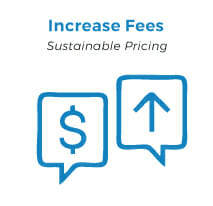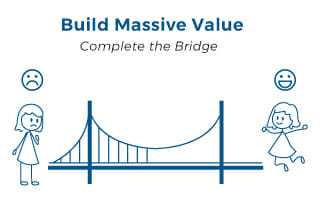An increasingly global world means there is more competition than ever, and commoditization is a growing threat.
Businesses that scale the right way, are going to be positioned to increase market share as weaker players are sifted out.
Whether you’re growing to your first million in revenue, are well past that and are looking to make your business more automated so that you can profitably scale up, or have hopes of an exit in the near future, it’s imperative that you avoid the mistakes that I’ll be discussing in this post.
Doing so will help you scale with more profit, more ease, and less stress.
Curious as to what these mistakes are? Let’s dive in.
1. You’re too busy to grow
Being stuck in day-to-day tasks is a huge problem because you can’t actually grow the business. Your main job as the CEO is to think and come up with better ways to do things. You need to generate ideas to increase profits, enter new markets, and so on.
You can’t do this if you are married to your routine. You’ll be wearing blinders. And you’ll miss out on the numerous opportunities sitting right in front of you.
Does your alertness follow this curve? When are you most focused and productive?
How to fix it:

- Carve out at least 5-10 hours per week for growth
- Start your day with crystal clear intention. Always create a plan for your day with the top 3 most important things you need to accomplish that day.
- Work within the human natural alertness cycle by using your first “Power Hours” of each day on growth tasks.
- Schedule email so that you aren’t living in your inbox. Do not check email until at least 11am if at all possible.
2. You’re trying to scale too soon
Many business owners try to scale too soon. Instead, they should first focus on making the business sustainable and bake in as much profit as possible.
Leverage first, then scale.
I often see business owners reach a hump that they can’t quite get over and it’s usually because their pricing structure cannot sustain profitable growth. They know they should increase prices, but fear creeps in.
Many experts may say “Just raise your rates,” but if it were that easy, everyone would have more profitable businesses.
The harsh reality is that clients might not be willing to pay you more.
Why? The answer is risk vs. reward. The risk is too high, and the reward is too low.
Clients are willing to pay much more if:
- You offer a solution they truly want
- Your client has access to funds
- You can sufficiently lower the risk for them to make it a no-brainer
How to fix it:

- Leverage first, then Scale.
- Work out that formula to be able to increase fees so you’ll have the resources to grow.
- Evaluate the kinds of problems your business can solve
- Evaluate your sweet spot by looking at what you enjoy, and evaluating unfair advantages.
- Evaluate client type that you can add the most value to
- Evaluate ways to better utilize your unfair advantage
- Only after you’ve increased value, and fees should you scale. Look for cost advantages and ways to decrease the cost of delivery (I’ll dive into that further below).
I’ve seen those who leverage first and are able to double their revenue per client, with little or no growth to their team. It’s pure profit. It works. I’ve seen it work both in my own business and for others that I have worked with.
3. It’s all about you
Everything is about your process and the steps you take, instead of your client’s pain points, and what they want.
If you want to get lost in a sea of downward spiraling mediocrity, then keep focusing your website on the “me show” and only discuss your services, tools, credentials, and so on.
Instead, you should be discussing the problems your ideal prospects want solved. Make everything about them, and the solutions they want. They want their problem solved. End of story.

How to fix it:
- Choose one painful $100k+ problem to solve, one client type, and one customized (not custom) outcome.
- Guarantee it, and jack up your fees to price based on the value of the outcome.
4. You’re not solving a big enough problem
Going back to the last two mistakes, if the problem is too small, you cannot charge enough. The problem is rooted in the industry dogma of refusing responsibility for lackluster results.
It’s nearly impossible to sell results and offer some guarantee… if you are selling everything to everyone.
Ask yourself “how can this work for this business?”
Back to the actions in the last step, it’s by solving one painful problem, for one type of client, with one customized solution.
What outcome could you provide? And what needs to be in place to ensure success?

An agency owner I know realized that for just one niche that they work with, they could consistently add an extra $1M per year to their business.
With this knowledge, the selling conversation shifted from “we are the best Facebook ad provider, we have great results, happy clients, books and awards…” to “we’re partnering with 10 [special niche] businesses that want to add an additional $1M this year without [thing they don’t want]. Is that something that interests you?”
It’s now a qualification process and the business is now able to more than double their fees.
Do you solve $10k problems, or $100k problems? $100k problems, or $1M problems?
Who could you work with where your service provides the highest dollar value?
Given a bigger outcome, and low enough risk, clients will happily invest more. Throw the hourly thinking out the window where either clients leave empty-handed or you leave tens of thousands of dollars on the table.
How to fix it:
- Create a list of characteristics of past ideal clients you’ve gotten the best results for. What do these clients have in common?
- Looking ahead, what do new clients need to have in place to be able to guarantee success?
- Craft an irresistible offer and promise (it should scare you a bit).
- Create your hit list, and sell!
Clients are demanding better. Are you ready to be part of the change that elevates the industry?
5. You’re too people focused
What do I mean by that?
Most business owners are too focused on finding the perfect staff, and not focused enough on developing their own perfect client solution and then plugging staff into defined roles as they scale their own methodology.
When your business is built around an employee’s skill sets, what happens when they leave? You need to start all over again recruiting, training, and developing this next ‘perfect’ person.
Instead, focus on how to scale a proven methodology and put the right people in place within your framework.
The services you scale are determined by your 80/20 framework. It can be divided into ‘brain skills’, and ‘hand skills’. Brains are more expensive, and in higher demand.
Are you as the owner doing ‘Brain’ work, ‘Hands’ work?

Optimize your best skills. Free up capacity for the Brain people to do their best work. Raise profit per project by having the Hands do the rest.
How to Fix:
- Build your proven methodology by focusing first on the end outcome. Then reverse engineer the stages to where you start the engagement.
- Breakdown the stages into smaller steps and tasks.
- Delegate by needed skill level only for each task to optimize staffing budget (save time with my Rapid Delegation Script).
6. You’re not consistently marketing and selling every day
“I’m too busy to do marketing.” I hear this all the time.
This thinking keeps you stuck working with less profitable clients just to meet payroll. You may even have a couple of demanding clients who bring in too much of your income (and most of your problems). You’re afraid to rock the boat because the pipeline to replace the income is near empty.
There is a magical shift that happens in your business as you consistently, and proactively attract excess ideal clients. You become in control. You set your fees. You decide who you will, and who you will not work with.
Organic growth will happen if you are any good at what you do. But do you want to be like the little bird with its beak open waiting for the worm saying “Feed me, feed me?”
Or, are you attracting your best, most profitable, and enjoyable clients?
How to Fix:
- Build a daily habit to block out time every day on your calendar and each out to 5 ideal prospects. Have one live conversation with someone who might be a prospective client. Every day.
7. You’re being reactive rather than being proactive
Most business owners are reactive. They fight fires, rather than prevent them. They tread water hoping to stay afloat when the next wave hits.
Being proactive is looking for ways to innovate within your company and increase profits. It’s staying ahead of the industry trends. It’s being intentional about the staff you want in your company and developing the kind of culture you want to create.
It’s about actually having a plan and working that plan every day.

This seems basic, but most service business owners lack a clear plan to scale their business, so they spend years reaching their goals (that’s if they don’t burn out first).
Do you drive your business, or does your business drive you? This is one tiny hinge that moves a pretty big door.
If you are not clear and proactive about top things you need to accomplish every day to really move your business forward, you’re not in the driver’s seat.
If you are making any of these seven mistakes as you’re trying to scale your services, you’re making it much harder than it needs to be.
Avoiding these mistakes will help you:
- Build a team that really supports you
- Work with more ideal clients
- Consistently and predictably deliver on your company’s promises
- Increase revenue and get your life back
What mistakes are you making? What will you do this week to take the path to increased profitability and freedom in your business?
About the Author

Mandi Ellefson is the founder of the Hands-Off CEO. She helps service businesses and agencies achieve life balance, and productivity by freeing up to 20-50% of their work week and achieving cost savings gains of up to 67%. For a proven 5-step plan to scale your service the right way, download her Scalable Growth Roadmap.